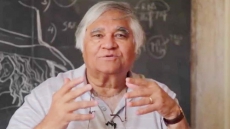OTTAWA — Justin Trudeau says he abandoned a proposed meeting with Donald Trump in Washington this week after the White House insisted that the prime minister first agree to a five-year "sunset clause" in a renegotiated North American Free Trade Agreement.
Trudeau told the anecdote Thursday during a media briefing where he and Foreign Affairs Minister Chrystia Freeland were outlining the Canadian response to punishing U.S. tariffs on steel and aluminum imports.
With the NAFTA talks seeming close to a possible breakthrough, Trudeau says he suggested to the U.S. president last Friday that they sit down with Mexico's Enrique Pena Nieto and talk about reaching a deal.
PM Trudeau & Chrystia Freeland Respond to U.S. Tariff AnnouncementPrime Minister Justin Trudeau and Foreign Affairs Minister Chrystia Freeland speak with reporters in Ottawa about the Trump administration's decision to impose tariffs on steel and aluminum imports from Canada, Mexico and the European Union.
Posted by CPAC - Cable Public Affairs Channel on Thursday, 31 May 2018
"I stated that I thought we were quite close to reaching an agreement, and perhaps the time had come for me to sit down with the president in Washington in order to finalize the NAFTA agreement," Trudeau said in French.
"We already had the bones of a very good agreement for all parties, and I thought it might be opportune for all of us to sit down for a few hours and discuss it."
Trump seemed to like the idea, Trudeau said.
Then on Tuesday, Vice-President Mike Pence called to say the White House would host the meeting — but on one condition.
"I had to agree to a sunset clause in NAFTA, which is to say every five years, NAFTA would come to an end unless the parties decided to renew it, which is completely unacceptable to us," he said.
"So I answered that, unfortunately, if that was a precondition to our visit, I was unable to accept — and so we did not go to Washington for that day of negotiations."
Commerce Secretary Wilbur Ross said Thursday that the decision to slap Canada and Mexico with stiff steel and aluminum tariffs was based on a lack of progress in the NAFTA talks.
U.S. Tariffs On Steel Will Hit Canadian Defence Industry: Minister
OTTAWA — Procurement Minister Carla Qualtrough predicts "significant consequences" to Canada's defence industry as the U.S. moves to impose tariffs on Canadian steel.
The minister says she doesn't believe the tariffs will alter the government's plan to purchase new military gear from the U.S. because extra money is typically set aside for unexpected circumstances.
American tariffs on Canadian aluminum & steel are unacceptable. As we have said, we will always stand up for our workers, and today we’re announcing retaliatory measures to this attack on our industry.
— Justin Trudeau (@JustinTrudeau) May 31, 2018
Canada will also challenge these illegal & counterproductive measures under NAFTA Chapter 20 and at the WTO. It is simply ridiculous to view any trade with Canada as a national security threat to the US and we will continue to stand up for Canadian workers & Canadian businesses.
— Justin Trudeau (@JustinTrudeau) May 31, 2018
But she says they could hit Canadian businesses, some of which say they are watching closely to see how the dispute unfolds.
The Trump administration says it is imposing a 25 per cent tariff on Canadian steel and 10 per cent tariff on Canadian aluminum starting at midnight tonight, ostensibly because of national-security concerns.
Qualtrough, however, says it is "difficult to fathom" how Canadian steel could pose a security threat, given the close security relationship between the two countries and extent of integration between their respective defence sectors.
Canada will impose tariffs against imports of steel, aluminum, and other products from the US – we are imposing dollar for dollar tariffs for every dollar levied against Canadians by the US.
— Justin Trudeau (@JustinTrudeau) May 31, 2018
She spoke on the sidelines of Cansec, an annual arms-trade show where defence companies from around the world showcase their wares to government and military officials.
ALUMINUM AND STEEL USERS DISAPPOINTED WITH IMPOSITION OF HEFTY U.S. TARIFFS
Canadian makers and users of aluminum and steel say they are disappointed but not surprised by the Trump administration's decision to impose hefty tariffs on steel and aluminum produced north of the border.
United States Commerce Secretary Wilbur Ross says exemptions for Canada, Mexico and Europe from import duties of 25 per cent on steel and 10 per cent on aluminum will expire as of midnight, as scheduled.
Americans remain our partners, friends, and allies. This is not about the American people. We have to believe that at some point their common sense will prevail. But we see no sign of that in this action today by the US administration.
— Justin Trudeau (@JustinTrudeau) May 31, 2018
The head of the Aluminum Association of Canada says the 10 per cent tariffs to be imposed Friday on his industry will cause the most harm to Americans who will face higher prices for goods made from the metals, but could also damage smaller Canadian suppliers.
Jean Simard says Americans will continue to pay a premium to purchase aluminum in addition to the new tariff as suppliers are likely to pass the price increase on to consumers.
He says the tariff designed to protect the U.S. industry is the wrong tool directed at the wrong place.

The United States used 5.5 million tonnes of aluminum last year, largely imported from Canada, but only produced about 700,000 tonnes domestically.
The U.S. Beer Institute says its members, which includes Denver and Montreal-based Molson Coors Brewing Co., are united against the tariffs on imported aluminum.
Institute CEO Jim McGreevy called the tariffs a new tax on the U.S. beer industry.
He said the tariffs will in the long run increase the cost of global beer production but have a disproportionate impact on American brewers and jobs.

Molson Coors analyst Brittany Weissman of Edward Jones says brewers will try to pass along the higher costs to consumers but the industry's current demand challenges may make that difficult.
She says most companies have some breathing room because of hedging contracts that protect them from wild price swings.
But aluminum prices have already risen as buyers have hoarded the material.

Molson Coors chairman Pete Coors says the company purchases 500 million pounds of aluminum annually. It makes up two-thirds of their U.S. packaging costs about 60 per cent in Canada.




